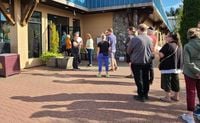On Saturday, April 18, 2025, voters across the region showed a strong interest in participating in the federal election as they lined up at advance voting stations. This surge of enthusiasm coincides with the Easter long weekend, which offers early voting opportunities from April 18 to April 21. Polls are open from 9 am to 9 pm each day, allowing voters ample time to cast their ballots.
In Langford, one advance voting location reported wait times extending up to an hour and 45 minutes, reflecting the eagerness of residents to make their voices heard as the general election approaches. Despite the long lines, election workers remained dedicated to ensuring the voting process ran smoothly. Voters arriving before 9 pm are guaranteed the right to vote, even if they are still in line.
The 45th General Election Day is set for Monday, April 28, 2025, and advance voting is a crucial part of the electoral process. Voting is also available at Electoral District Offices (EDOs) in every riding, which typically experience shorter wait times. EDOs will be open daily from April 18 to 21 from 9 am to 9 pm, and until 6 pm on Tuesday, April 22, 2025. There are approximately 500 EDOs across Canada, including locations in Cowichan-Malahat-Langford, Esquimalt-Saanich-Sooke, Victoria, and Saanich-Gulf Islands.
Voting at EDOs requires voters to bring their voting card and a piece of identification, such as a driver’s license. Trained staff at these offices assist voters through the special ballot process, making it accessible and straightforward.
Interestingly, today’s long lineups at advance voting stations follow the previous night’s English federal leaders debate. While it's uncertain how the debates impact voter decisions, they often provide critical insights into candidates’ positions and policies.
Moreover, early voting not only reflects the readiness of voters but also aids candidates and their teams in mobilizing their supporters. With many voters already having made up their minds, candidates can focus their efforts on those who have yet to cast their votes.
However, as the election draws nearer, conversations surrounding voter participation have also surfaced. Some individuals express a sentiment of “why bother voting?” due to the perceived certainty of Conservative victories in certain ridings. In the Cariboo-Prince George riding, for instance, the Conservative candidate previously secured 50.85% of the vote, while in the Prince George-Peace River-Northern Rockies riding, the figure was even higher at 60.7%. This raises concerns about voter turnout and the impact of complacency on the electoral process.
Despite the likelihood of Conservative wins, experts argue that every vote counts. A strong turnout from other parties can signal the presence of diverse viewpoints within these ridings. Ultimately, Members of Parliament (MPs) are elected to represent all constituents, not just those of their party. Each election serves as a “job interview” for MPs, allowing voters to express their views on the performance of their elected representatives.
Another trend emerging from discussions about the federal election is the belief that “our prime minister needs to do something.” However, it’s essential to clarify that the prime minister is not an all-powerful leader; rather, they are the head of the party with the most seats in Parliament. Unlike presidential systems, the prime minister must work collaboratively with their party and, at times, seek the support of opposition parties to enact significant changes.
As Todd Whitcombe, a professor of chemistry at the University of Northern BC, points out, the responsibility for government action does not rest solely on the prime minister. Instead, it involves a collective effort from all members of Parliament and the government as a whole. This system of checks and balances is designed to prevent the abuse of power and ensure that diverse perspectives are considered in decision-making processes.
As the April 28 election date approaches, it’s crucial for voters in Prince George and beyond to recognize their power. Engaging in the electoral process is not just about choosing a candidate; it's about voicing opinions and influencing the direction of governance.
In summary, the excitement surrounding advance voting reflects a vibrant democratic spirit among Canadians. With opportunities to vote early and participate in the electoral process, residents are encouraged to make their voices heard. Whether through advance voting or at EDOs, every ballot cast contributes to shaping the future of the nation.





